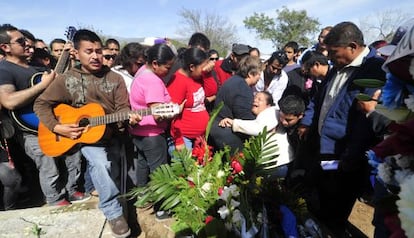The music died the day Kombo Kolombia played its final dance tune
Mexico shocked by the murders of 14 band members, executed by narcos

It was the biggest massacre of musicians that anyone could remember. It was also the first major mass killing since President Enrique Peña Nieto took office barely two months ago.
The 14 members of Kombo Kolombia -- a Colombian-style vallenato band -- and their three roadies were kidnapped in the early morning hours of January 25 while they played at a private party at a bar some 40 kilometers from Monterrey, Nuevo León.
Some days later, their bodies were found in a common grave with gunshot wounds to their heads.
Just as many Mexicans have become victims for one reason or another of the ongoing drug war, musicians are far from immune to a cartel chief's wrath. If a drug boss doesn't like a particular song or a band refuses an invitation to perform, the outcome can be fatal.
On that early Friday morning, about a dozen armed men broke into La Carreta cantina and took all the members of Kombo Kolombia and their assistants by force. The men also robbed the estimated 50 patrons before fleeing.
The band was taken to a ranch located in a deserted area a few kilometers from a major highway connecting Monterrey with Monclova, Coahuila state -- a strategic drug route that the notorious Zetas and Gulf cartels are battling for.
The Kombo Kolombia musicians and their roadies were all shot and then each given a coup de grâce, and thrown into a hole some 70 centimeters wide and 15 meters deep.
They were killed near a major highway -- a drug route the notorious Zetas and Gulf cartels are battling for
No one knows exactly how, but one of the band members was able to escape and, after he was treated for his wounds, cooperated with Nuevo León law enforcement authorities. Jorge Domene, a spokesman for the state authorities, said that one of the motives investigators are looking into is whether the mass murders were part of a revenge mission against the Zetas by the Gulf cartel; the reason being that in the act of these "direct and not by chance shootings," he said, none of the patrons inside La Carreta were harmed.
Authorities also believe that the gunmen allowed one of the members of the band to escape so that he could describe his nightmare to authorities. Another theory is that the Gulf cartel wanted to create a public commotion to force the government to beef up security on the highway to prevent the Zetas from being able to control the route.
The wave of killings of popular local musicians has been on the rise since November 2006 when Valentín Elizalde, known as "El gallo de oro" (The Golden Rooster), was gunned down as he left a fair in Reynosa, Tamaulipas state. Since then other nationally known musicians such as Sergio Gómez, the lead singer of K-Paz de la Sierra, have been murdered by the drug cartels.
"Performers are currently living in an uneasy climate," said Sergio Islas, a concert promoter who has worked the circuit for the past 15 years. "Crime has affected the entire line -- from the recording industry to the actual performers. There have been attacks on bars, disappearances of some groups, such as the Yerberos, for example, and there are places where, because of the violence, many artists refuse to perform."
Francisco Guamea, a journalist with 19 years of experience, said there was "a big difference" between established artists and those who play in the streets, and others who want a performance contract. "A lot of musicians have to suffer exploitation from those who hire them. The rule is: I pay but you play until I say stop," Guamea said.
The massacre of Kombo Kolombia, which was about to record its first CD, has shocked the entire country. As of Wednesday, no suspect had been arrested over the killings.
Tu suscripción se está usando en otro dispositivo
¿Quieres añadir otro usuario a tu suscripción?
Si continúas leyendo en este dispositivo, no se podrá leer en el otro.
FlechaTu suscripción se está usando en otro dispositivo y solo puedes acceder a EL PAÍS desde un dispositivo a la vez.
Si quieres compartir tu cuenta, cambia tu suscripción a la modalidad Premium, así podrás añadir otro usuario. Cada uno accederá con su propia cuenta de email, lo que os permitirá personalizar vuestra experiencia en EL PAÍS.
¿Tienes una suscripción de empresa? Accede aquí para contratar más cuentas.
En el caso de no saber quién está usando tu cuenta, te recomendamos cambiar tu contraseña aquí.
Si decides continuar compartiendo tu cuenta, este mensaje se mostrará en tu dispositivo y en el de la otra persona que está usando tu cuenta de forma indefinida, afectando a tu experiencia de lectura. Puedes consultar aquí los términos y condiciones de la suscripción digital.








































